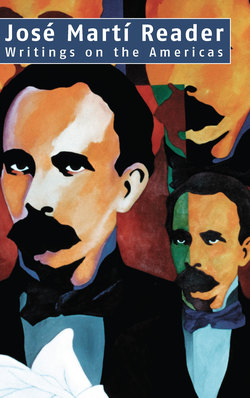Читать книгу José Martí Reader - José Martí - Страница 13
На сайте Литреса книга снята с продажи.
ОглавлениеThe Memorial Meeting in Honor of Karl Marx
Following the death of Karl Marx in London on March 14, 1883, a memorial meeting was held in the Cooper Union hall in New York City, March 20, 1883. The walls were hung with banners proclaiming “Workers of all lands, unite!” José Martí’s account of the meeting was published in La Nación, Buenos Aires, May 13 and 16, 1883.
Look at this large hall. Karl Marx is dead. He deserves to be honored for declaring himself on the side of the weak. But the virtuous man is not the one who points out the damage and burns with generous anxiety to put it right; he is the one who teaches a gentle amendment of the injury.
The task of setting men in opposition against men is frightening. The compulsory brutalization of men for the profit of others stirs anger. But an outlet must be found for this anger, so that the brutality might cease before it overflows and terrifies. Look at this hall: dominating the room, surrounded by green leaves, is the picture of that ardent reformer, uniter of men of different peoples, and tireless, powerful organizer. The International was his creation: men of all nations come to honor him. The crowd, made up of valiant workers, the sight of whom affects and comforts, shows more muscles than jewels, and more honest faces than silk underwear. Labor beautifies: it is rejuvenating to see a farm worker, a blacksmith or a seaman. By manipulating the forces of Nature, they become as beautiful as Nature is.
New York goes on being a kind of vortex: what boils up in the rest of the world, in New York drops down. Here they smile at one who flees; out there, they make him flee. As a result of this kindness, a strength has come to this people. Karl Marx studied the methods of setting the world on new foundations, and wakened those who were asleep, and showed them how to cast down the broken props. But being in a hurry, with his understanding somewhat clouded, he did not see that children who do not have a natural, slow and painful gestation are not born viable, whether they come from the bosom of the people in history, or from the wombs of women in the home. Here are the good friends of Karl Marx, who was not only a titanic stimulator of the wrath of European workers, but also showed great insight into the causes of human misery and the destiny of men, a man driven by a burning desire to do good. He saw in everyone what he carried in himself: rebellion, the highest ideals, struggle.
Here is Schevitsch, a journalist: see how he speaks: reflections of the sensitive, radiant Bakunin reach him: he begins to speak in English; he addresses others in German. “Dah! Dah!” his compatriots reply enthusiastically from their seats when he speaks to them in Russian. The Russians are the whip of the Reform — no more! These impatient and generous men, tarnished with anger, are not the ones to cement the New World: they are the spur, and prick like the voice of a conscience which might be falling asleep: but the steel of the spur cannot be used as a construction hammer.
Here is Swinton, an old man inflamed by injustice, who saw in Karl Marx the grandeur of mountains and the light of Socrates. Here is the German Johann Most, persistent and unlovable shouter, lighter of bonfires, who does not carry in his right hand the balm to heal the wounds inflicted by his left. So many people have come to hear them that the hall overflows and they spill out into the street. Choral societies are singing. Among so many men, there are many women. With applause, they repeat in chorus quotations from Karl Marx on posters hanging on the walls. Millot, a Frenchman, says something lovely: “Liberty has fallen many times in France, but it has risen more beautiful from each descent.” Johann Most speaks fanatical words: “From the time that I read Marx’s book in a Saxon prison, I took up the sword against human vampires.” Says McGuire: “Rejoice to see united, without hatred, so many men of all countries. All the workers of the world belong to a single nation, and do not quarrel among themselves but are united against those who oppress them. Rejoice to have seen 6,000 French and English workers meeting together near what had been the ominous Paris Bastille.” A Bohemian speaks. A letter of Henry George’s1 is read — the famous economist, friend to the distressed, loved by the people, famous here and in England. And with salvos of thunderous applause and frenzied hurrahs, the fervent assembly rises in one unanimous movement, while from the platform two men with open countenance and glance of Toledo steel read out in German and English the resolutions with which the whole meeting ends — in which Karl Marx is named the most noble hero and most powerful thinker of the world of labor. Music sounds; choirs resound; but note that these are not the sounds of peace.
New York, March 29, 1883
